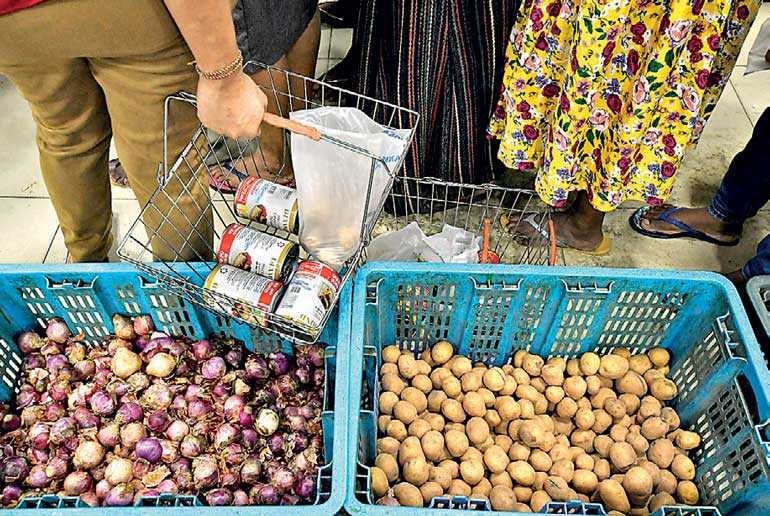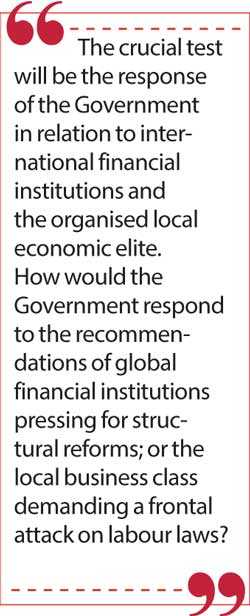Tuesday Feb 24, 2026
Tuesday Feb 24, 2026
Tuesday, 5 May 2020 00:37 - - {{hitsCtrl.values.hits}}

The Government is yet to declare its plan for economic revival. So far, the Government’s response has been limited to making rhetorical references to notions like national economy and so forth – Pic by Shehan Gunasekara
While the public was occupied with news on the latest developments of the coronavirus pandemic last week – of increasing numbers of patients, of infected naval officers and the Government’s relaxation of curfew measures – an interesting article authored by Franklyn Amerasinghe was published in the Daily FT (17 April) titled ‘Employers and their ability to pay post COVID-19’. Amerasinghe is a former Head of the Employers’ Federation of Ceylon. 
The article argued that large businesses are facing difficulties due to the pandemic and this difficult situation demands a substantive relaxation of labour laws and standards. Further, it claimed that ‘social justice’ should be interpreted subjected to the right of conducting business; and labour law enforcement in Free Trade Zones should be suspended for three months. The writer further suggested that the Termination of Employment of Workmen’s Act, which imposes restrictions on firing workers, should be amended accordingly.
Meanwhile, on 6 April, in a letter addressing the Minister of Labour, the Head of the Employers’ Federation of Ceylon Kanishka Weerasinghe also forwarded a number of demands. This included demands such as subsidising the private sector to pay wages of workers, enabling employers to renegotiate terms of employment including wages and holidays, allowing employers to employ workers beyond statutory working day limits and also without extra pay for overtime work.
Consequences if these demands are enforced are self-evident; a large number of workers would lose their jobs, there would be significant cuts in wages and workers will be compelled to work under extremely precarious conditions without any sense of employment security. These harsh demands reflect a looming crisis; a healthcare crisis transforming itself into a full-scale socio-economic crisis.
Structural adjustment reforms
It is of no surprise if one might think that the proposals of the Employers’ Federation, the representative body of the most prominent businessmen in the country, are just and logical due to the magnitude of the crisis at hand. This is no surprise because throughout the past few decades we have been accustomed to look at economic matters through a particular lens: thinking the private sector as the engine of the economy. 
According to this view, businesses should thrive if the economy is to prosper. If businesses, especially if big businesses are in a large-scale crisis, they should be rescued – bailed out – at any cost. All other considerations: labour rights, wellbeing of workers and labour regulations are of secondary importance.
This free market fundamentalist conception that assumes markets are virtuous and could recover on its own if they are given the required freedom is the underlying logic of one of the perspectives that has been advanced as a response to the looming socio-economic crisis. Within this paradigm, reviving the economy is mainly the responsibility of the private sector and the state should facilitate them by removing unnecessary obstacles such as restrictive labour laws.
This perspective is not something exclusive to the Employers’ Federation in Sri Lanka. On 23 March, David Malpass, the President of the World Bank Group, issued a statement outlining the measures they intend to employ to combat the economic repercussions of the pandemic. The press release states:
‘...Countries will need to implement structural reforms to help shorten the time to recovery and create confidence that the recovery can be strong. For those countries that have excessive regulations, subsidies, licensing regimes, trade protection or litigiousness as obstacles, we will work with them to foster markets, choice and faster growth prospects during the recovery.’
This extract is a text-book example for the free market fundamentalist approach. The crux of the argument is that the state should facilitate markets to bloom through imposing structural adjustment policies.
Structural adjustment policies refer to a number of economic liberalisation measures prescribed by international financial institutions such as the International Monetary Fund and the World Bank starting from the 1980s. These were especially imposed on third world countries as debt conditionalities with the view of integrating these economies to the international economy. These packages included measures such as privatisation of public assets, slashing subsidies targeting the poor, commodification of public services and lifting import restrictions that aimed to protect small scale producers from international competition.
Effects of structural adjustments were largely devastating for the poor in third world countries; particularly for small scale farmers and petty producers. As Mike Davis vividly explains in his celebrated work ‘Planet of Slums’ (2005), one of the main reasons behind the large growth of slum population in Asian and African cities following the 1980s was the harsh impact structural adjustment policies had on rural economies.
Thousands were compelled to migrate into cities looking for livelihood and settle in informal settlements. Though detrimental for the poor, these policies were beneficial for certain sections; especially for parasitic local economic elites enriching themselves through securing access to the liberalised import markets or grabbing a portion of privatised state assets.
Disaster capitalism
How would the post-coronavirus socio-economic crisis be handled globally? One of the most likely scenarios is global capital’s use of the crisis as an ‘opportunity’ to reinforce its authority and consolidate hegemony. The crisis would be handled in a manner that benefits the rich while shifting the economic burden on poorer sections. Worse, there are signs indicating that the crisis would offer a fresh opportunity for the economic elite to remove barriers and obstacles that were hitherto restricting its further expansion and entrenchment.
Canadian scholar Naomi Klein introduced the notion ‘Disaster Capitalism’ in her book ‘The Shock Doctrine’ (2007) to explain how private capital manipulates natural or man-made disasters in order to expand its reach.
For instance, in a hypothetical situation where a constructing company secures a contract to rebuild infrastructure affected by a storm – the response to the disaster is ‘privatised’ and it enables private profiteering. ‘Shock therapy’ refers to deliberate political interventions in times of crisis that aim to restructure socio-economic processes for the benefit of businesses and corporations.
For example, at the moment, certain States in the United States have moved to enact laws facilitating fossil-fuel companies to proceed with their projects that were previously opposed by environmental activists. Due to the emergency and the pandemic, the resistance has been weakened; and the crisis is used as an opportunity to advance the agenda of companies. The full-scale economic liberalisation imposed on Chile following the coup d’état in 1973 is one of the classic examples of how crisis offers openings for further capital accumulation.
Sri Lanka is not immune to this global phenomenon. It is in this context that the recommendations of the World Bank on structural reforms and local employers’ demands on drastic measures against labour should be taken into consideration. The Government is yet to declare its plan for economic revival. So far, the Government’s response has been limited to making rhetorical references to notions like national economy and so forth. The stimulus package targeting poor sections of the society is a welcoming move; but it has been criticised from a comparative perspective in terms of adequacy.
For instance, according to economic analyst Ahilan Kadiragamar, the total budget for the relief package in Sri Lanka amounts to a mere 0.13% of the GDP; whereas neighbouring countries such as Bangladesh (2.5%) and Pakistan (2%) and also states like Kerala in India (2% of the state GDP) have performed better.
However, the crucial test will be the response of the Government in relation to international financial institutions and the organised local economic elite. How would the Government respond to the recommendations of global financial institutions pressing for structural reforms; or the local business class demanding a frontal attack on labour laws?
Keeping this question in mind, it is interesting to look at the composition of the Task Force appointed by the President a few days ago for the purpose of economic revival and poverty alleviation. In addition to a number of public officials, the Task Force comprises the following individuals: Owner – Nature’s Secrets, Chairman – MAS Holdings, CEO – The Kingdom of Raigam, Executive Officers of E.B. Creasy and Co. and the Sanmik Group.
What role do these individual barons, or their representatives have in a public task force? If it is a matter of involving all stakeholders, what about millions of working masses who are expected to encounter the harshest blow? Why are trade unions or labour organisations representing these masses not on board?
Thus, it would be interesting to see the nature of the ‘revival’ plan the Government intends to present. In a context in which the organised business class has demanded a reduction of labour laws – and also, larger concessions for themselves – it is not difficult to anticipate where the class allegiances of the Task Force lie. Though it might be too early to state anything definite, one thing could be stated for sure: disaster capitalism is out there – right at our doorstep.
(The writer is an academic affiliated to the Department of Legal Studies, The Open University of Sri Lanka. He can be reached at [email protected])